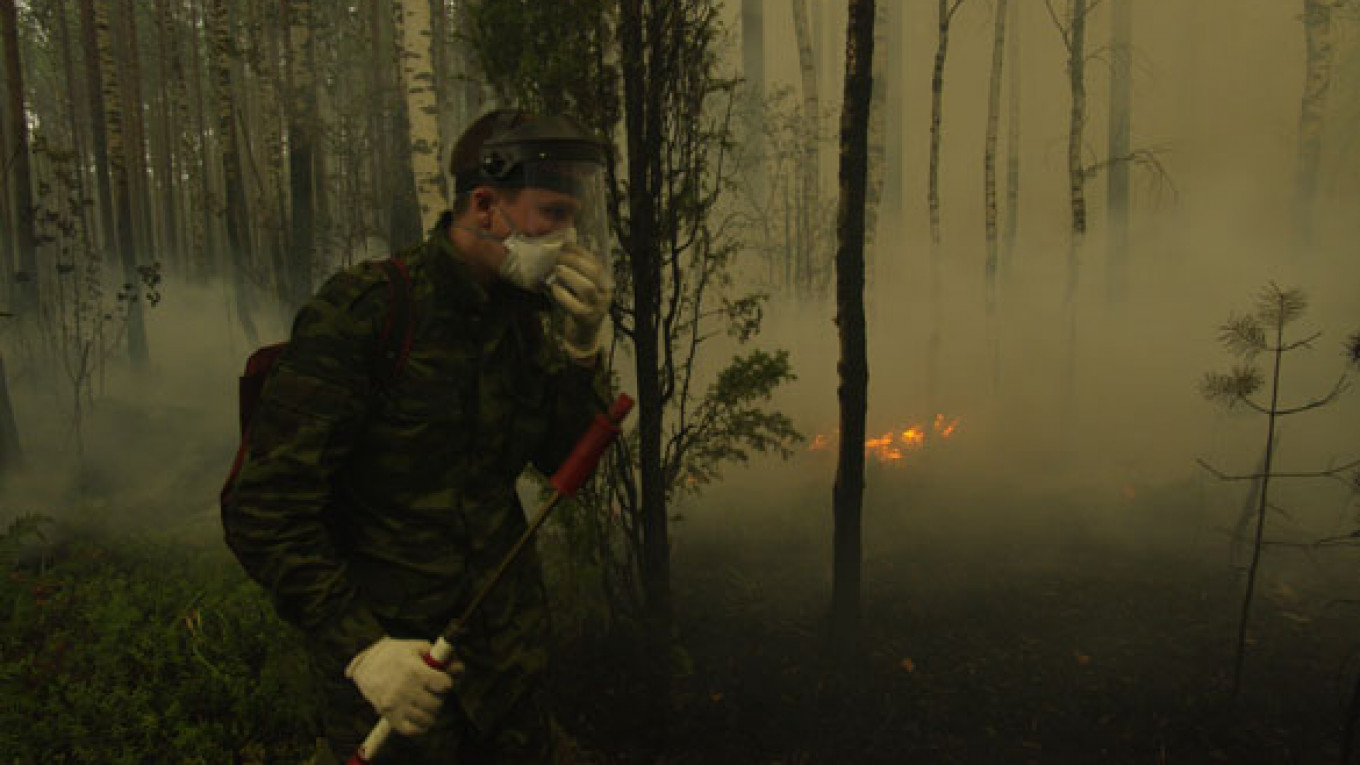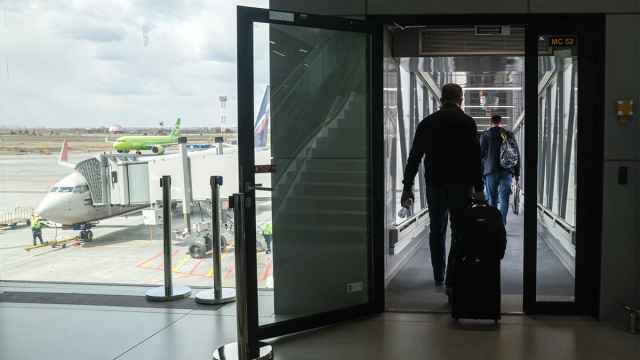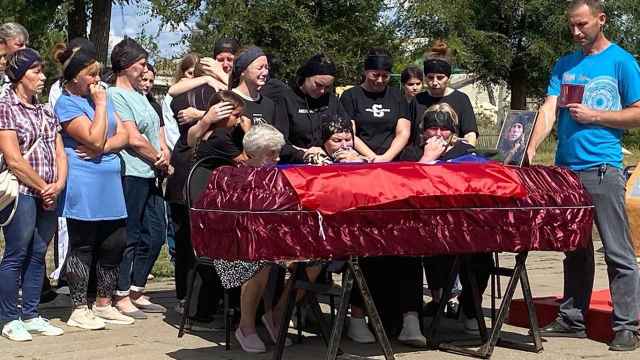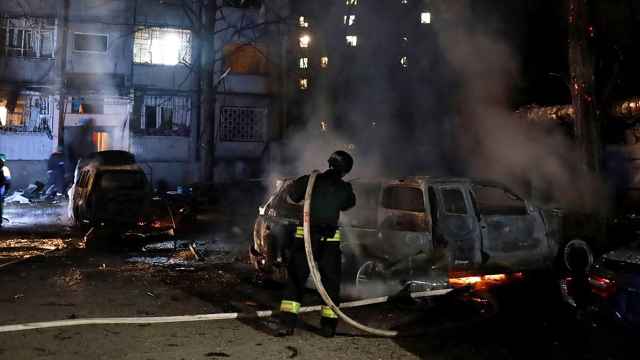YUVINO, Ryazan Region — Maria Gladchenko was looking forward to her vacation — a rafting trip down a river in Marii-El. Instead, she found herself hauling 20 liters of water around a charred pine forest in the Ryazan region, along with a dozen other volunteers.
“My vacation has been spoiled because Marii-El is on fire,” Gladchenko said. “So I decided to do something about the fires here.”
With little information about the scope of Russian wildfires on the main, state-controlled television channels, a sense of doom and urgency dawn on most Muscovites only when the wind carries smoke from the Ryazan and Vladimir regions into the capital, as it did last Sunday.
But a grassroots campaign to direct donations to affected regions and exchange information about the real state of affairs has been under way for the past two weeks, with hundreds of trucks and volunteers like Gladchenko distributing supplies and working to prevent wildfires from reaching more villages.
A promise by Emergency Situations Minister Sergei Shoigu to bring the fires under control within a week in the Moscow region infuriates firefighters and volunteers, who have been battling seemingly unquenchable fires that quickly spread over dry forests and fields during this summer's record heat wave.
Shoigu said Aug. 8 that fires in the Moscow region would be eliminated in seven days. But on Sunday, when a week had passed, the fires were still raging. The town of Noginsk resorted to street-cleaning trucks to stop the flames within just 1,500 meters of its buildings, local media reported. One volunteer, who was helping out firefighters by creating a fire line with a tractor, died in the Lukhovitsy district on Sunday after he failed to escape the flames.
"If the rain pours nonstop for seven days in a row, the fires could probably be suppressed. But otherwise there is no chance," said firefighter Konstantin as he hosed down burning pine trees to stop the flames from going up into the crowns.
A brief thunderstorm around the village of Yuvino, where Konstantin is based, did not quench the flames but only temporarily lowered some of the bigger ones. Until the weather shifts in the fall, the only hope is to push fires back from villages, not put them out, firefighters said.
'Not a Forest'
Konstantin together with eight other professional firefighters arrived from the Tula region to Yuvino, a village of 80 houses surrounded by the pine forests of the Meshchersky National Park. The firefighters, who have experience extinguishing flaming buildings, do not normally work in forests. The night before, a 40-meter-high wall of fire nearly engulfed Yuvino, together with the firefighters and several residents who chose not to evacuate, they recalled. They were saved by a fortunate change in wind direction.
Many weeks with no rain have left the naturally moist forest bone-dry. Stepping on what was once moss turns it into dust. A mere spark ignites the biomass like gunpowder.
“It’s not a forest; it’s a disaster!” said Sergei, a lieutenant colonel in charge of the firefighters in Yuvino.
Sergei and other professional firefighters interviewed for this story spoke on condition that their last names be withheld, citing fears of a conflict with their superiors. While some did not want to be seen criticizing the authorities, one firefighter, bare-chested and wearing charcoal-stained pants, said he just did not want to get into trouble for not donning his firefighting uniform. "It's too hot," he said.
With two firetrucks at Sergei's disposal, he has no pump to fill them up. He also lacks tents, so the firefighters have to sleep on the ground or on top of the trucks, covering up with their jackets. The bulky trucks cannot drive close to the forest fire, and the two fire hoses do not reach far enough into the forest from the road. With power lines to Yuvino toppled by falling trees, the firefighters were cut off from the outside world for some time after their cell phone batteries died. Volunteers later provided a generator.
Volunteers, widely snubbed by professional firefighters because of their lack of experience, have saved several villages by using basic shovels and buckets of water and sand. Even after a larger fire is suppressed with a fire hose, the underbrush often continues to burn, and a gust of wind can ignite it into a blaze once again. Using shovels and water backpacks, volunteers in Yuvino isolated burning groundcover, cleared a fire line around the village, and loaned firefighters a pump to fill their trucks.
“When the fires just started, everybody thought of helping the victims. Nobody thought that the firefighters needed help because it is common knowledge that a firefighter arrives at the scene on a firetruck with a fire pump and fully equipped,” said Igor Chersky, a radio host and LiveJournal blogger whose blog has become a coordination center of sorts for volunteers.
“But after a few trips were made to deliver donations, it became clear that the firefighters had nothing but a few rusty trucks, not even food," he said. "That changed our whole approach. Now the Internet is full of requests for fire hoses and other equipment.”
Supply and demand is coordinated through a few charity organizations and a LiveJournal community called pozar_ru, which is filled with urgent calls for help and drivers offering to deliver supplies as far from Moscow as the Voronezh region.
By Monday, almost 18 million rubles ($590,000), along with about 200 tons of goods, had been donated to the Synodal department of the Russian Orthodox Church, which oversees charity collection and whose church on Nikoloyamskaya Ulitsa in Moscow has become the city's largest coordination center for donations and volunteers. Some of the money has already been used to buy fire hoses, face masks, pumps and fire extinguishers, it said on its web site, Miloserdie.ru.
170 Volunteers a Day
About 170 people volunteer daily on Nikoloyamskaya, sorting through donated goods and supplies, sending out several trucks carrying donations every day, and managing the process, which was set up within days of the first call for donations on July 31.
Some 100 volunteers rushed about on a recent afternoon, loading and unloading cars and directing food, water bottles, medicine and other donations to mounting piles on the premises. The volunteer coordinator gestured directions while holding on to a clipboard with the sign, "I have lost my voice."
Valeria, a journalist in Moscow, said she first stopped by on Aug. 4 and has ended up coming almost every day.
"I stopped by my job yesterday, but as long as I turn in all the work they don't care that I am gone," she said in an interview, pausing every 30 seconds to take phone calls with one hand and searching for information on the Internet about a burned-down village in the Lipetsk region with the other.
"Ten or 12 families are homeless, and their church burned down," she said. "We sent a group of volunteers who wanted to help put out the fire, and they have disappeared for the past three days. Now I am trying to find the head of the village."
In a nearly complete information vacuum regarding the location and gravity of fires, coordinators in Moscow have had to rely on information handpicked by people who have gone to the regions with deliveries.
"Sometimes you have three sources who tell you three different stories," Valeria said, so volunteers have been sent on reconnaissance missions to locate "decent local coordinators" and compile lists of the precise needs of fire victims.
The lack of organization and coordination is apparent.
On Friday, Emergency Situations Ministry representative Alexander Dudnikov, whose phone number was published on the ministry web site as a contact for volunteers, told The Moscow Times that volunteers were no longer needed in the Moscow region because “the threat has passed.” The next day, the ministry announced in a statement that “help is still needed.”
Curiously, potential volunteers calling the Emergency Situations Ministry’s fire hotline have been directed to Nashi, the pro-Kremlin youth movement, bloggers said. Nashi confirmed on Friday that it had called the ministry and offered to help. "We provided a bus that our activists and other volunteers can use to reach the affected places,” said Maria Pititsina, a Nashi member who arranged the agreement with the ministry.
Chersky said that while he had seen Nashi activists in scorched villages such as Laskovsky, in the Ryazan region, he doubted that they were actually providing meaningful help. “They came there wearing shorts and flip-flops, and when the cars drove up bringing donations, they came by and asked to hand the donations out,” he said.
A Message from The Moscow Times:
Dear readers,
We are facing unprecedented challenges. Russia's Prosecutor General's Office has designated The Moscow Times as an "undesirable" organization, criminalizing our work and putting our staff at risk of prosecution. This follows our earlier unjust labeling as a "foreign agent."
These actions are direct attempts to silence independent journalism in Russia. The authorities claim our work "discredits the decisions of the Russian leadership." We see things differently: we strive to provide accurate, unbiased reporting on Russia.
We, the journalists of The Moscow Times, refuse to be silenced. But to continue our work, we need your help.
Your support, no matter how small, makes a world of difference. If you can, please support us monthly starting from just $2. It's quick to set up, and every contribution makes a significant impact.
By supporting The Moscow Times, you're defending open, independent journalism in the face of repression. Thank you for standing with us.
Remind me later.






